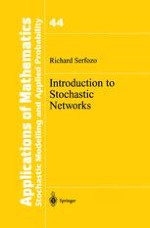1999 | OriginalPaper | Buchkapitel
Reversible Processes
verfasst von : Richard Serfozo
Erschienen in: Introduction to Stochastic Networks
Verlag: Springer New York
Enthalten in: Professional Book Archive
Aktivieren Sie unsere intelligente Suche, um passende Fachinhalte oder Patente zu finden.
Wählen Sie Textabschnitte aus um mit Künstlicher Intelligenz passenden Patente zu finden. powered by
Markieren Sie Textabschnitte, um KI-gestützt weitere passende Inhalte zu finden. powered by
An ergodic Markov process is reversible if, in equilibrium, the expected number of transitions per unit time from one state to another is equal to the expected number of the transitions in the reverse order. This is also equivalent to a time-reversibility property that, at any instant, the future of the process is stochastically indistinguishable from viewing the process in reverse time. A remarkable feature of such a process is that its equilibrium distribution is readily obtainable as a certain product of ratios of its transition rates. A classic example is a birth-death queueing process. This chapter describes a wide class of reversible Markov network processes with batch or multiple-unit movements as well as single-unit movements. Examples include multivariate birth-death processes with single and batch increments and reversible Jackson and Whittle processes. The last two sections cover partition-reversible processes, which are generalizations of reversible processes. Invariant measures for such processes are obtainable by solving balance equations separately on subsets that partition the state space.
